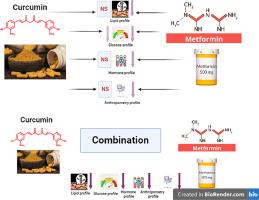二甲双胍和姜黄素对多囊卵巢综合征妇女的影响:一项因子临床试验。
IF 8.3
1区 医学
Q1 CHEMISTRY, MEDICINAL
引用次数: 0
摘要
背景:多囊卵巢综合征(PCOS)是女性常见的内分泌疾病,与血脂异常、胰岛素抵抗和内分泌失调有关。二甲双胍和姜黄素有望单独改善这些代谢和激素参数,但它们在多囊卵巢综合征中的联合作用仍不明确:我们进行了一项随机、双盲、安慰剂对照、为期 12 周的因子试验,共有 200 名患有多囊卵巢综合征的女性参加。参与者按 1:1:1:1 的比例随机分配接受二甲双胍(500 毫克/8 小时)+ 安慰剂、纳米姜黄素软胶囊(80 毫克/8 小时)+ 安慰剂、二甲双胍(500 毫克/8 小时)+ 纳米姜黄素(80 毫克/8 小时)或双安慰剂。在基线和第12周评估血脂概况、葡萄糖代谢指标、激素参数、体重和体重指数(BMI):结果:二甲双胍和姜黄素的组合与单药或安慰剂相比,在血脂概况、葡萄糖代谢、激素参数、体重和体重指数方面均有显著改善。联合疗法可显著降低低密度脂蛋白胆固醇、总胆固醇和甘油三酯水平,同时提高高密度脂蛋白胆固醇水平。此外,联合疗法还能明显改善葡萄糖代谢指标,并在减轻体重和降低体重指数方面显示出协同效应。联合疗法还能降低睾酮,改善卵泡刺激素(FSH)和促黄体生成素(LH)水平:结论:与单个药物或安慰剂相比,二甲双胍和姜黄素联合疗法在改善多囊卵巢综合征女性患者的血脂状况、糖代谢、激素参数、体重和体重指数方面显示出卓越的疗效。这凸显了联合使用这些药物治疗多囊卵巢综合症的潜在协同效应。本文章由计算机程序翻译,如有差异,请以英文原文为准。

Effects of metformin and curcumin in women with polycystic ovary syndrome: A factorial clinical trial
Background
Polycystic ovary syndrome (PCOS) is a common endocrine disorder in women, associated with dyslipidemia, insulin resistance, and hormonal imbalances. Metformin and curcumin have shown promise in improving these metabolic and hormonal parameters individually, but their combined effects in PCOS remain unclear.
Methods
We conducted a randomized, double-blind, placebo-controlled, 12-week factorial trial involving 200 women with PCOS. Participants were randomly assigned in a 1:1:1:1 ratio to receive metformin (500-mg/8 h) + placebo, nanocurcumin soft gel capsule (80-mg/8 h) + placebo, metformin (500-mg/8 h) + nanocurcumin (80-mg/8 h), or double placebo. Lipid profiles, glucose metabolism markers, hormonal parameters, body weight, and body mass index (BMI) were assessed at baseline and week 12.
Results
The combination of metformin and curcumin demonstrated significant improvements in lipid profiles, glucose metabolism, hormonal parameters, body weight, and BMI compared to individual agents or placebo. Greater reductions in low-density lipoproteins (LDL) cholesterol, total cholesterol (TC), and triglyceride (TG) levels were observed with the combination therapy, along with increased high-density lipoproteins (HDL) cholesterol. Additionally, the combination therapy significantly improved markers of glucose metabolism and showed synergistic effects in reducing body weight and BMI. Reductions in testosterone and improvements in Follicle-stimulating hormone (FSH) and Luteinizing hormone (LH) levels were also observed with combination therapy.
Conclusion
The combination of metformin and curcumin demonstrates superior efficacy in improving lipid profiles, glucose metabolism, hormonal parameters, body weight, and BMI in women with PCOS compared to individual agents or placebo. This highlights the potential synergistic effects of combining these agents for the management of PCOS.
求助全文
通过发布文献求助,成功后即可免费获取论文全文。
去求助
来源期刊

Phytomedicine
医学-药学
CiteScore
10.30
自引率
5.10%
发文量
670
审稿时长
91 days
期刊介绍:
Phytomedicine is a therapy-oriented journal that publishes innovative studies on the efficacy, safety, quality, and mechanisms of action of specified plant extracts, phytopharmaceuticals, and their isolated constituents. This includes clinical, pharmacological, pharmacokinetic, and toxicological studies of herbal medicinal products, preparations, and purified compounds with defined and consistent quality, ensuring reproducible pharmacological activity. Founded in 1994, Phytomedicine aims to focus and stimulate research in this field and establish internationally accepted scientific standards for pharmacological studies, proof of clinical efficacy, and safety of phytomedicines.
 求助内容:
求助内容: 应助结果提醒方式:
应助结果提醒方式:


